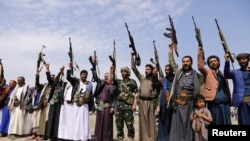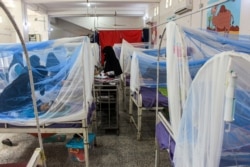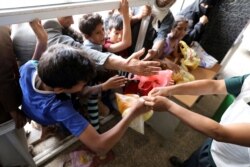The announced U.S. designation of Yemen’s Houthi rebels as terrorists could jeopardize diplomacy in the Gulf region and worsen Yemen’s already devastating humanitarian crisis, analysts say. U.S. President-elect Joe Biden has promised to restart diplomacy on the matter with Iran and reassess U.S. ties with Saudi Arabia, which has led the six-year-war in its impoverished southern neighbor.
The U.S. terrorist designation of Yemen’s rebels is expected to include sanctions against the Iran-backed movement and three of its leaders. It would take effect on President Donald Trump’s last full day in office, January 19.
The United Nations has warned that the designation could have serious repercussions on peace talks and efforts to combat the world’s largest humanitarian crisis in Yemen, the Arab world’s poorest nation.
U.N. spokesman Stephane Dujarric has urged Washington to grant exemptions to the announced sanctions to ensure humanitarian aid delivery is not disrupted.
The U.N. says that 80 percent of Yemen’s 30 million people need some form of aid or protection. More than 13 million Yemenis face acute food insecurity.
Yemen expert Helen Lackner, who has decades of experience on the country, told VOA that aid will be reduced because 90 percent of Yemen’s basic staples are imported, and that loss would worsen the already dire humanitarian situation. But she says Yemen’s people will suffer, not so much the Houthis.
“While this is on, people are going to die who wouldn’t die otherwise. Ordinary citizens, not the top leaders. Top leaders don’t usually suffer," she said. "It will not stop the Houthis. It will make very little difference to them. It will certainly make life much more difficult for humanitarian and negotiations because it could basically make it more difficult for others to negotiate with them, i.e., for the U.N. or simply logistically to have more access.”
Lackner says she hopes the designation, which was announced Sunday, can be reversed by the incoming Biden administration and that a new U.N. Security Council resolution could produce fresh talks to resolve the conflict. But that might be difficult.
Kristin Diwan, a senior resident scholar at the Washington-based Arab Gulf States Institute, says the incoming Biden administration already has Yemen in its sights because it would like to restart talks with Iran.
“The Yemen conflict might end up having to be tied in with what [the] Biden administration is doing with Iran because they are going to need all the levers that they can find to try to bring some resolution there,“ she said.
Diwan says confrontations in “Libya, Yemen and Qatar have reached a point of diminishing returns.” There is a need for conflict resolution, she says, especially in light of “the coronavirus pandemic and economic challenges, a lot of these states need to shift a bit more of their interests in addressing these big challenges at home.”






